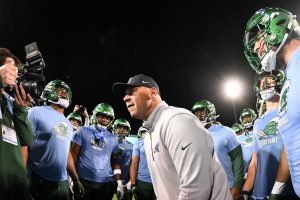OPINION | New Orleans vaccine mandate: Necessary or excessive?
August 25, 2021

On Aug. 12, Mayor LaToya Cantrell announced that proof of COVID-19 vaccination or negative test results must be shown in order to enter certain city establishments, effective on Aug. 16. This mandate marks a stark shift from virtually no COVID-19 restrictions this summer.
Unfortunately, the more infectious and more transmissible delta variant of the COVID-19 virus has contributed to a seven-day moving case average of 5,020 on Aug. 22, up from only 317 cases on June 1 in Louisiana.
Louisiana reports the second highest per capita COVID-19 case rate at 101 cases per 100,000 people and the fifth lowest vaccination rate in the nation with only 40% of residents fully vaccinated.
Louisiana Governor John Bel Edwards believes that mask-wearing and increased vaccinations should cause the rapid increase in infections to decline. Aside from his latest indoor mask mandate that expires on Sept. 1, Edwards does not plan on issuing any more statewide COVID-19 restrictions.
With the current status of vaccinations in Louisiana, it seems as if the New Orleans mandate is an attempt to persuade the general public to get inoculated in hopes of decreasing the high case rate in Louisiana.
Vaccine hesitancy is decreasing across all religious and demographic groups, including individuals who were previously resistant to vaccinations. According to a Public Religious Research Institute survey, fewer than 15% of Americans are hesitant to the COVID-19 vaccine as of late July, down from 28% in March.
Considering the Governor’s relaxed attitude towards COVID-19 restrictions, the New Orleans vaccine mandate is absolutely necessary, especially given that the state wide mask mandate expires in less than one week.
Current data suggests that the vaccine mandate is working. New Orleans communication director Beau Tidwell expects 80% of the adult eligible population to have at least one dose of a COVID-19 vaccine by the end of this week. Further, the city’s COVID-19 positivity rate is slowly decreasing. This data suggests that the public is feeling an urgency to get vaccinated, and to get vaccinated quickly, regardless of whether or not they agree with the mandate.
Public response to the vaccine mandate varies. In a @nolanews post announcing the new mandate, @joell51868 commented, “This is a fair compromise. I’m not getting vaccinated but I like that they’re giving an alternative.” Referencing Cantrell in the same post, @triciamaestricole said, “She’s only hurting the cities restaurants and bars business and cities tax $$$. People will just go elsewhere.” @ebonyreachinghigher expressed confusion with the law: “Do ppl with vaccines also have to proof of negative covid since they can also get the virus?”
This mandate is far from perfect. Being vaccinated does not mean that one is completely safe from the virus. However, current COVID-19 vaccines are 66% effective against infection from the delta variant. There are no known medical conditions which absolutely inhibit a person from getting a COVID-19 vaccine, so preventative measures are safe for the majority of people. An anaphylactic reaction to the COVID-19 vaccines is extremely rare, but even allergic reactions cannot be attributed to specific vaccine ingredients.
Larger consequences of the vaccine mandate include declining tourism in New Orleans and economic hits to businesses. Hopefully, this mandate is temporary. Once New Orleans reaches a high enough vaccination rate to ensure herd immunity, residents of this city can work together to recover from the devastating effects of the COVID-19 pandemic.
New Orleans is a vibrant, beautiful city with a strong sense of community and a rich history. Residents, locals, tourists and students should be able to come together and perform a collective duty that, in time, will allow us to appreciate the aspects of this place we love, miss and still have yet to fully experience.









Leave a Comment